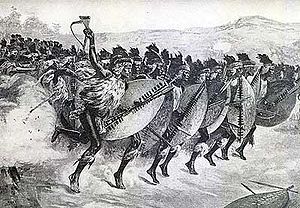Battle of Kambula
| date | March 29, 1879 |
|---|---|
| place | Cambula in South Africa |
| output | British victory |
| Parties to the conflict | |
|---|---|
| Commander | |
| Troop strength | |
| around 2,000 men | around 20,000 men |
| losses | |
|
18 dead |
up to 1,200 dead |
Isandhlwana - Nyezane - Rorke's Drift - Ntombe - Hlobane - Kambula - Gingindlovu - Ulundi
The Battle of Kambula was fought on March 29, 1879 as part of the Zulu War . The British troops under Evelyn Henry Wood triumphed over an army of the Zulu under Ntshingwayo Khoza .
prehistory
In 1843 the area of the former Boer republic Natalia was formally annexed by the British as the Natal colony . The powerful militaristic Zulu state in the neighborhood appeared to the British as a threat to their settlements in Natal. In January 1879, English colonial troops under Lord Chelmsford invaded the Zulu Empire of King Cetshwayo from Natal . In the Battle of Isandhlwana on January 22, 1879, the British suffered a catastrophic defeat in which more than 1,300 of the 1,800 British soldiers involved were killed.
While the middle and right departments of the British were pushed back after the disaster at Isandhlwana, the left department under Evelyn Wood was alone in Zululand. On March 28, there was a skirmish between Wood's cavalry , under Redvers Buller , and the main Zulu army at Hlobane , in which the Zulu were victorious.
The battle
Wood had taken up a fortified position at Kambula after the defeat of Hlobane. He was subordinate to 1,200 infantry , 650 cavalry and 120 artillerymen , a total of around 2,000 men. Opposite him was the main Zulu force under Ntshingwayo Khoza , who had already defeated the British in the Battle of Isandhlwana . In the Zulustreitmacht also fought Impis who also already fought at Isandhlwana and were equipped with captured firearms there. The battle began around 1:30 p.m. The Zulu attacked the British position unsuccessfully in several waves up to about 5:30 p.m., with losses of around 800 men alone. Then Wood began the counterattack, which is estimated to have killed at least another 300 Zulu people.
Result
The defeat at Kambula significantly weakened the morale of the Isandlwana victors and restored that of the British. Lord Chelmsford began to restructure his army in the summer and was able to destroy their forces on July 4th at the battle of Ulundi near the capital of the Zulu.
literature
- Donald Featherstone: Victorian Colonial Warfare. Africa. From the Campaigns against the Kaffirs to the South African War . Cassell, London 1992, ISBN 0-304-34174-6 .
- Ian Knight , Ian Castle: Zulu War . Osprey Publishing, Oxford 2004, ISBN 1-84176-858-8 .
- Charles L. Norris-Newman: In Zululand with the British Army. The Anglo-Zulu War of 1879 through the First-Hand Experiences of a Special Correspondent (= Eyewitness to War Series), Leonaur Ltd., 2006, ISBN 978-1-84677-121-7 .
References and comments
- ↑ Norris-Newman (2006), pp. 179f. - These figures come from official British sources to which war correspondents in various British newspapers had access.
